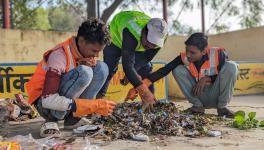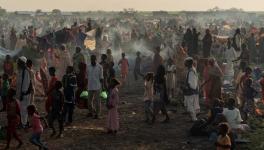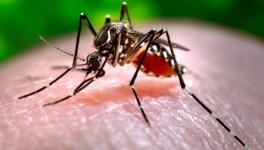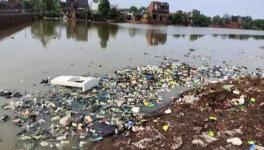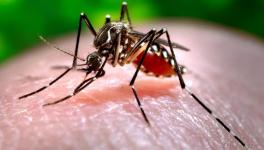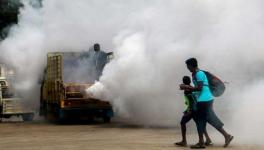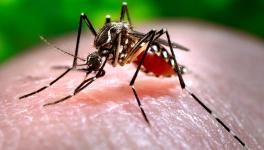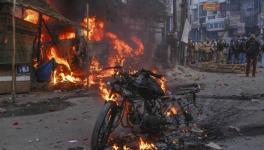Firozabad Faces Onslaught of Dengue, Viral Fever With Insufficient Health Facilities; Children Most Affected
Firozabad: On the night of September 13, Abhi Savita, a three-year-old kid, arrived at the State Medical College in Firozabad, Uttar Pradesh, for treatment along with his parents and uncle. Abhi’s body temperature was very high and he was unconscious.
The child was admitted to the hospital after the intervention of the local Chief Development Officer. Then, after half an hour, doctors referred Abhi to a higher-level hospital since his condition was deteriorating fast and the medical college did not have adequate resources to treat him.
“The doctors asked us to take him to a bigger hospital in Agra. His platelets have dropped to 30,000 and we are going to Agra,” Abhi’s uncle Govind Savita told Newsclick while sitting in an ambulance provided free of cost by the state’s healthcare services.
The state-run and private healthcare facilities in central-west Uttar Pradesh’s Firozabad district, about 250 kilometres from national capital New Delhi, are overwhelmed with the cases of suspected Dengue and viral fever. The majority of admitted patients are children below the age of 10 years.
On the same night of Spetember 13, Newsclick witnessed about a dozen parents coming to the medical college with their sick children. Children with very high fever were being admitted while others were being provided with medicines.
About ten years old, Aman Kumar was spotted lying on the floor outside the Emergency room at the Firozabad medical college. No one attended to him till the media intervened.
Aman told Newsclick that he had been running a fever for the last four days; that night, he had a severe stomach ache and had vomited a couple of times. He was taken in the ambulance to the Pediatrics ward, about 200 metres away from the Emergency room.
Aman’s condition deteriorated after reaching the Pediatrics ward and no doctor was attending to him. His mother started crying, and the helpless father started begging every doctor and hospital staff to treat his kid. It was only after that he was admitted for treatment.
This is not just the story of Aman Kumar or Abhi Savita but hundreds of other children who are bedridden due to the outbreak of suspected Dengue and viral fever. According to a report published in the Times of India, about 12,000 people in Firozabad district are sick and bedridden.
According to Firozabad District Magistrate Chandra Vijay Singh, 60 people, mostly children, have died due to this fever, and preventive measures were being taken to contain the situation.
“The condition in the district is stable now. The administration has increased the number of beds in the medical college. Health camps are being organised in over 90 places and sanitation work is also being done in different areas of the district where mosquito breeding grounds have been spotted,” the administrative officer said.
As per official information, 400 children are currently admitted at the medical college, and 120 of them are Dengue patients.
The District Magistrate told Newsclick that some people had died in private hospitals and other places, and their data was not included in the death toll. The administration was trying to trace them all so the figures might go up later, and a death audit committee was also set up to ascertain the actual causes of death.
Meanwhile, pigs were spotted roaming in filth inside the medical college campus and also behind the Pediatrics ward. When asked about this, the District Magistrate walked away.
The Newsclick witnessed the death of two children that night, a helpless father taking his unconscious daughter home on a cycle, several ambulances arriving with wailing sirens and more patients, and taking children to better healthcare facilities in neighbouring Agra.
Lack of Trust in Govt Healthcare Facilities
The sick rural population of the district has more trust in the non-registered medical practitioners than the state-run healthcare facilities. For instance, when this reporter reached the clinic of A Kumar, a graduate in Bachelor of Homeopathic Medicine (BHMS), about half a dozen people were lying on the cots there with an IV inserted in their hands and saline kits hanging from walls and windows.
In Sufipur village, A Kumar, the non-registered medical practitioner, told Newsclick that he treated about five to six patients every day and referred Dengue patients to the state-run facilities.
“Several quacks are operating in the village, and I am treating people because many of them are sick and are not getting treatment in the government hospitals,” he said.
The district administration has registered a police case against eight quacks and sent notices to over 200 unregistered clinics.
Kishori Lal, the father of a seven-year-old boy, who was being treated at Kumar’s clinic, said that he did not go to the government hospital because a girl had died there.
“I am a small worker, and I do not have much money to afford treatment at a bigger hospital, so I came here and my son is much relieved with this treatment,” he said.
Pediatrician Dr Salman Khan said that there was no specific treatment for Dengue, and doctors only treated the symptoms. “This looks like the Den 2 virus of Dengue which is a mutated form. This is highly infectious and has a high mortality rate. Parents need to be very careful and not go to quacks for treatment,” he said.
According to the National Vector Borne Disease Control Programme, this year, Uttar Pradesh recorded 160 cases of Dengue till July 2021.
The highly affected district of Firozabad has 19 public health centres, three community health centres, 220 sub-centres and three hospitals, according to the Rural Health Statistic 2019-20 report. The same report mentions that the healthcare centres in Uttar Pradesh cater to almost double the population than it’s supposed to. The data from the report shows that the sub-centres cater to 8,413 people whereas it should cater to 5,000; the primary health centres cater to 60,696 whereas they should cater to 30,000 population and the community health centres cater to 2,45,857 whereas they should cater to 1.2 lakh population.
Death and Devastation
On September 14 morning, an elderly lady was wailing outside the Pediatrics ward. Her seven-year-old granddaughter had succumbed to a high fever at the hospital. “My granddaughter was doing well and now she is dead,” she was heard saying.
A lot of people gathered there to console the old lady, and the public started calling out the administration for the acute lack of sanitation and their tall claims.
“The newspapers are publishing that sanitation work is being done everywhere, but other than the 13 designated wards, no work has been done in the villages and people are falling sick,” an old man present there said.
Meanwhile, the reporter received a phone call from Abhi Savita’s house and they begged for help. “Sir, we did not get admission in Agra. We brought Abhi to a private clinic and they are saying there is no life in Abhi. Please help…”
The reporter reached out to the Chief Medical Officer (CMO) Dr Dinesh Kumar Premi for help but he said, “Treatment is being given to everyone and what the media needs to do is to run positive news.” The CMO did not offer any help and Abhi was declared dead fifteen minutes after this. His uncle pointedly blamed the doctors at the state-run medical college for the death.
“Had he received treatment on time. He would have been alive,” Abhi’s uncle said.
Get the latest reports & analysis with people's perspective on Protests, movements & deep analytical videos, discussions of the current affairs in your Telegram app. Subscribe to NewsClick's Telegram channel & get Real-Time updates on stories, as they get published on our website.









